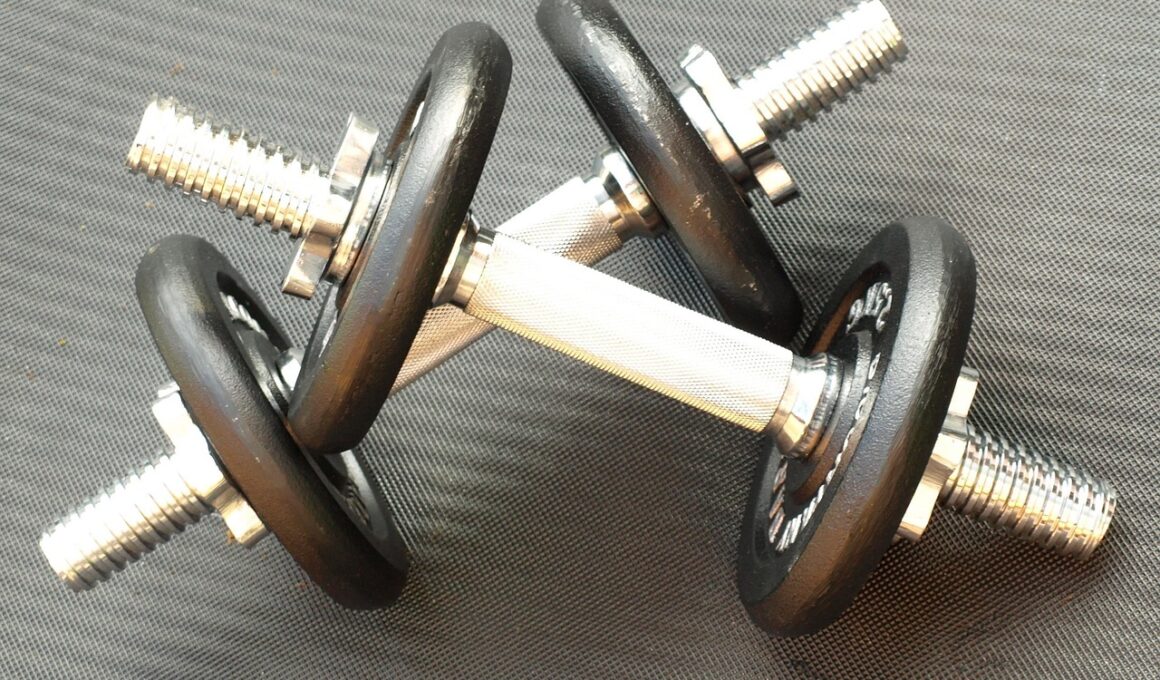How Gym Equipment Longevity Relies on Proper Weight Handling
Returning weights to their rightful place in the gym is an essential aspect of fitness etiquette. When gym-goers neglect this responsibility, it affects not only the equipment’s condition but also the overall experience of other members. Properly returning weights ensures that equipment lasts longer and remains functional. Each time dumbbells, bars, or plates are left lying around, they are at risk of being bent, damage the flooring, or contribute to safety hazards. For optimal gym operation, all equipment needs to be neatly stored away. Keeping weights organized also helps other enthusiasts locate the necessary gear quickly. Additionally, all gym members should commit to maintaining cleanliness and orderliness, creating an environment conducive to training. Establishments with such etiquette demonstrate professionalism, valuing each member’s effort to maintain the equipment. Ensuing responsibility shows respect towards fellow users considering a clean environment reduces anxiety and improves focus during workouts. Ultimately, returning weights to their places can significantly impact gym equipment longevity and overall user satisfaction. As fitness enthusiasts, everyone should actively contribute to a pleasant gym environment by adhering to this important guideline.
Gym etiquette extends beyond just returning weights; it encompasses a shared responsibility for maintaining cleanliness. When users conclude their workout, wiping down machines and benches is crucial. Sweat from equipment not only causes deterioration but is also a point of health concern for subsequent users. Gyms that emphasize clean equipment provide an enjoyable atmosphere and promote hygiene. Creating a habit of cleaning after each use can lead to significant positive changes in gym culture. Gym members must also understand the need to replace weights when finished. Leaving them scattered on the floor can cause accidents, potentially resulting in serious injuries. By returning weights, adherents to etiquette maintain recognizable weight areas and convenient access for everyone. Moreover, this reinforces a respectful attitude toward others. Every time someone places weights back in their designated spots, they set an example for others to follow. Establishing this practice instills camaraderie among gym members, where mutual respect fosters a community spirit. In conclusion, returning weights and ensuring cleanliness are vital to excellent gym etiquette while encouraging fellow members to develop similar habits. Sharing responsibility highlights camaraderie in fitness facilities, contributing to a welcoming environment.
Understanding the Importance of Weight Management
Returning weights shows respect not only for the equipment but also for individuals. Every member has a shared role in maintaining the gym environment. When weights are routinely returned, potential injuries decrease, ensuring a safer space for all users. Various studies have shown that gym statistics indicate a significant number of injuries happen when equipment is not returned to appropriate locations. Additionally, weights left out contribute to feelings of chaos in the gym. When items are poorly organized, it can be difficult to find the equipment needed for a workout. This contributes to inefficient use of time for gym-goers trying to fit in a productive session. Moreover, returns signify personal accountability and reflect a member’s commitment to the gym’s atmosphere. Prioritizing a clean and organized training space promotes efficiency and higher motivation levels among fitness enthusiasts. Weight management is not just about lifting; rather, returning weights after use fosters a shared sense of responsibility. Each member must acknowledge their role plays a vital part in enhancing overall gym experience. In a sense, etiquette surrounding weights positively influences equipment longevity and morale, which should be a goal shared between all gym members.
When gyms incorporate signage advocating proper weight handling and returning practices, it maximizes user awareness. Clear messages displayed at relevant points encourage members to maintain cleanliness and organization. Facilities can provide simple reminders to respect space and ensure safety by returning equipment. Furthermore, conducting orientation sessions for new members can emphasize etiquette. Addressing proper equipment use promotes an inviting atmosphere for all. Gyms can actively engage members through challenges rewarding those who consistently follow returning weights protocols. By instilling values of responsibility, gyms cultivate a respectful environment. Past experiences have showcased improvements in culture, resulting from simple actions like returning weights. Organizations observing etiquette encourage accountability, thereby enhancing the facility’s overall atmosphere. Moreover, members benefit from improved relationships through shared commitment to a clean space. Inspection checklists can keep the gym in top shape, deterring neglect over time. The responsibility for maintaining gym equipment relies on everyone. All members play a crucial role in promoting a positive experience through best practices in etiquette. With collective awareness about maintaining order within training spaces, gyms can transform into conducive environments that foster growth and achieve fitness goals.
Conclusion: Building a Community of Respect
In summary, the act of returning weights demonstrates respect and consideration for fellow gym members, contributing to long-term equipment longevity. Implementing etiquette guidelines fosters a culture of shared responsibility, creating an inclusive environment for training. Good practices regarding weight management extend into various aspects of fitness, emphasizing mutual respect and care. When each member commits to a routine of returning weights, it shapes the gym’s makeup and inevitably reveals a collaborative nature amongst users. The more disciplined individuals are about returning equipment, the more enjoyable the experience becomes for everyone. By adhering to simple guidelines, gyms can flourish in cleanliness and safety, encouraging new and seasoned members alike to thrive. As fitness enthusiasts engage with their communities, positive behaviors benefit everyone involved. Ultimately, the gym transforms into a supportive environment where aspirations can be pursued selfishly without concern for safety—only driven by respect for each other’s space. The role of returning weights in shaping a gym environments provides insight into the potential growth culture through simple actions. Education surrounding responsibility ensures everyone can play a role in creating a flourishing gym zone and communal experience.
The journey toward responsible gym etiquette begins with the recognition of personal accountability. Members have the power to influence culture and morale in their fitness environments by adopting a disciplined approach to returning weights. Consistency in practicing etiquette strengthens collective actions among members, making it easier to uphold standards within the gym. While it may seem trivial to focus on such details, the effects of returning weights permeates into the fitness community, nurturing healthy habits. Becoming advocates for responsibility encourages engagement among members, enhancing overall experiences while working out. Practicing cleanliness ratifies commitment to gym values while helping others stay safe and secure in their routines. Consequently, a respectful community emerges as members join forces in ensuring the gym remains inviting, organized and practical. With collective responsibility, each person actively participates in shaping experiences conducive to personal growth. Hence, it nurtures supportive interactions while progressing towards fitness goals. The dialogue surrounding gym etiquette inches closer to higher standards and practices on responsibility, fostering accountability. In such spaces, there is no room for carelessness or neglect as every individual contributes positively to the community. Modern gyms thrive on collaborative respect, urging members to create lasting connections through mindful actions.
To wrap up, returning weights is more than a compliance; it enriches the overall gym experience for everyone involved, promoting safe practice that reinforces community values. Beyond just personal development, members affect the lives of others. This includes several factors, which can affect the psychological state of individuals working hard to better themselves. When equipment is returned properly, it not only respects the gym but displays a commitment to better practices. Moreover, individuals should embrace shared responsibility, making it contagious among others. A tighter-knit community emerges out of such principles, as the gym turns into not just a place of exercise, but ultimately therapy. This intertwines support and encouragement, vital for navigating challenges during workouts and pushing boundaries. Moreover, allowing social bonds to flourish elevates experiences within fitness environments. An attitude of respect fuels the ongoing relationships between members who often encourage each other in their journeys. The collective pursuit of improving gym etiquette symbolizes what fitness encompasses — strength gained through collaboration. Therefore, returning weights illustrates the essence of shared commitment to a brighter, more resilient fitness culture. Ultimately, effective ways to promote gym etiquette are borne from awareness surrounding responsible weight management, creating enthusiastic advocates for cooperation.
Realigning gym cultures begins with understanding the significance of returning weights. Being mindful of personal accountability can instill camaraderie among members who support one another in their journeys. Those who actively practice returning weights demonstrate respect toward fellow users while improving their gym experience. As users adhere to best practices for returning weights, they herald a movement toward communal responsibility, ensuring everyone feels welcomed to train. Each time someone makes an effort to return weights, they set an example for others to follow, and this consistently cultivates a culture of cooperation in gym environments. When members unite and remind one another about the importance of equipment management, it conjures stronger ties that ripple throughout the entire community. With continuous networking regarding proper etiquette, the benefits of returning weights extend beyond a single individual; it amplifies through the establishment, enabling a gratifying workout atmosphere synonymous with support. Thus, establishing these responsible habits reinforces shared values, fostering unity and creating a respectful environment. Ultimately, the spirit of cooperation generated by returning weights is a stepping stone toward improved gym ethos, which positively influences all members. Adopt every opportunity to educate and engage others about the importance of responsible weight handling in shared fitness spaces.





